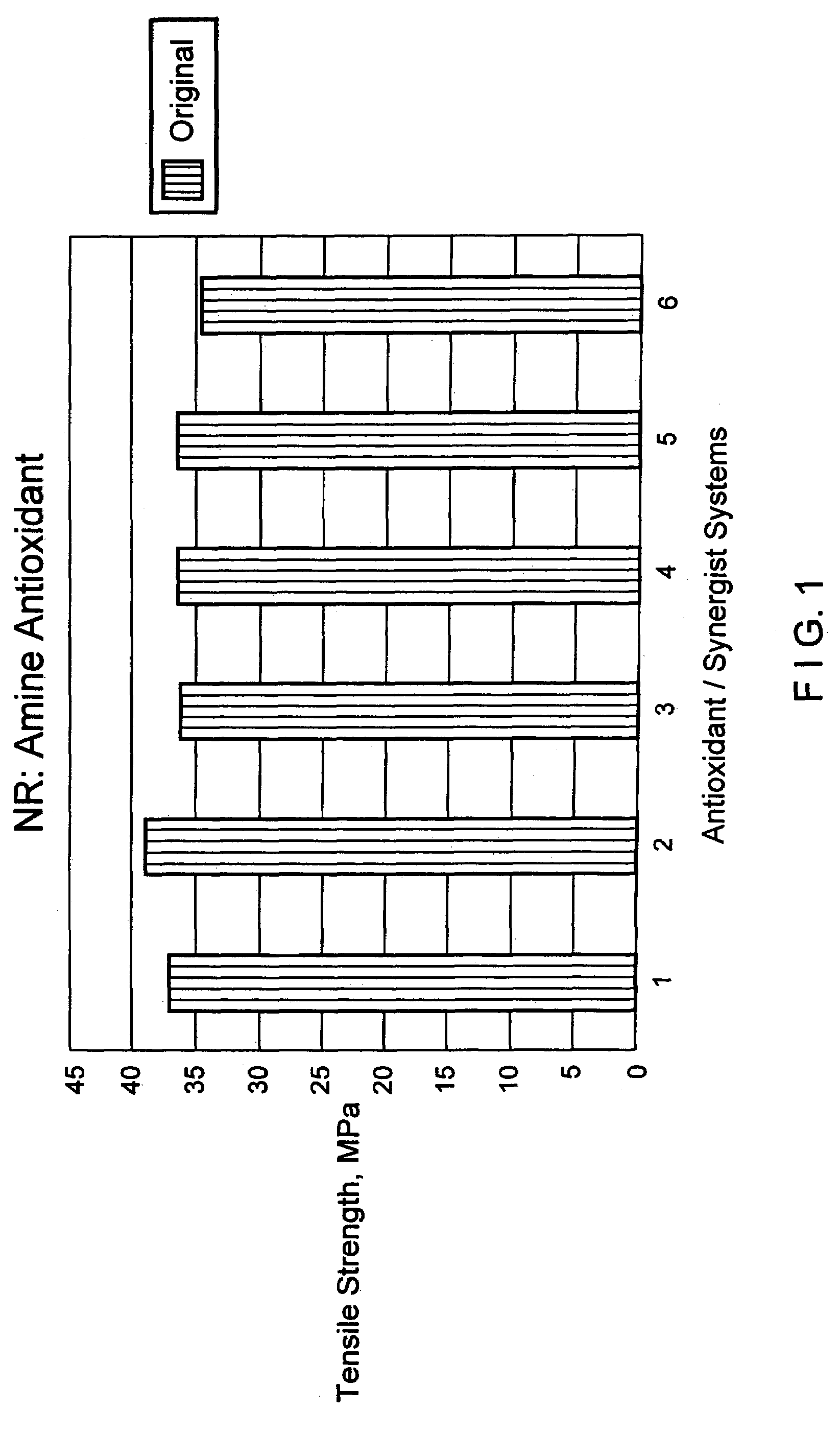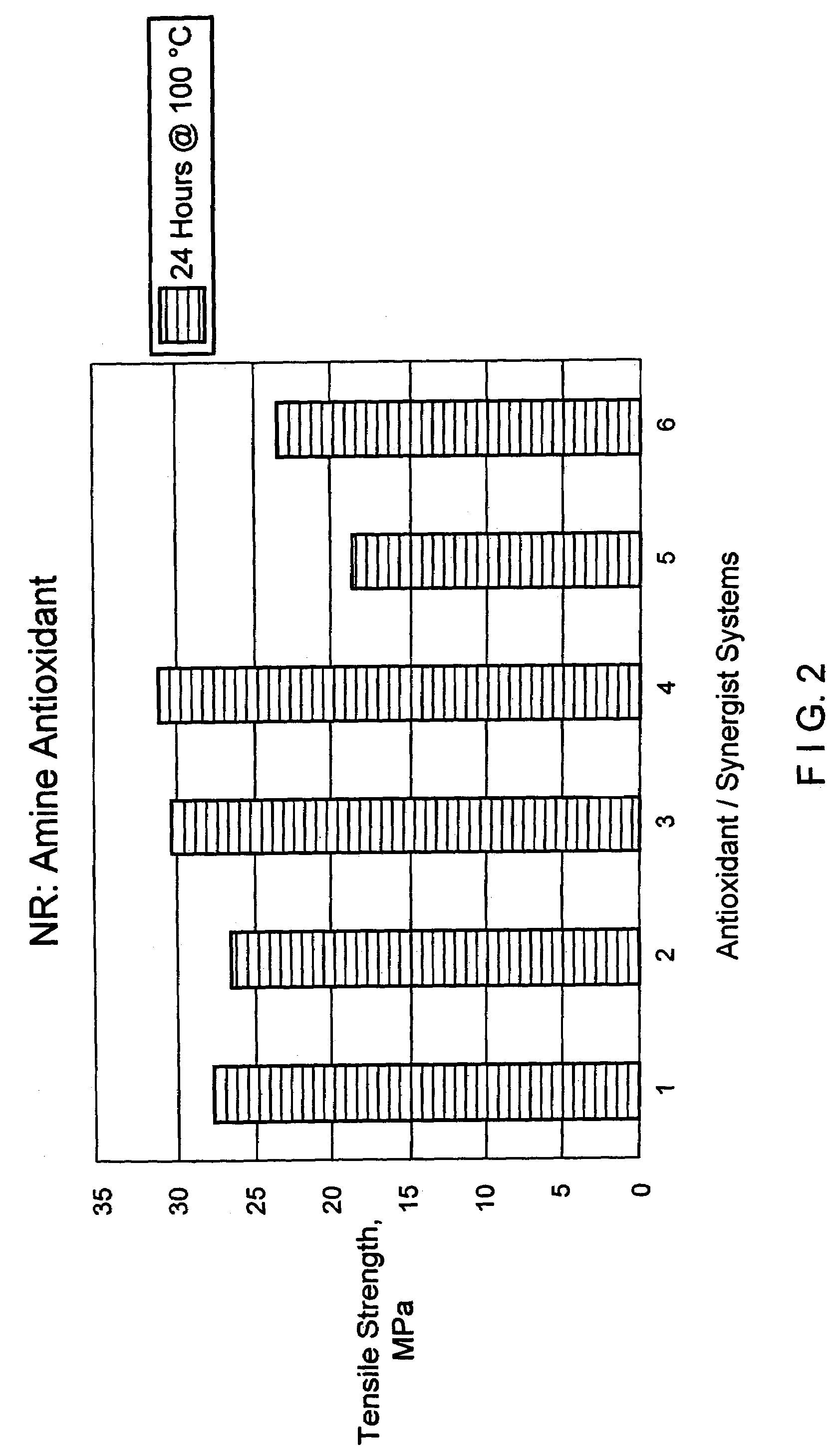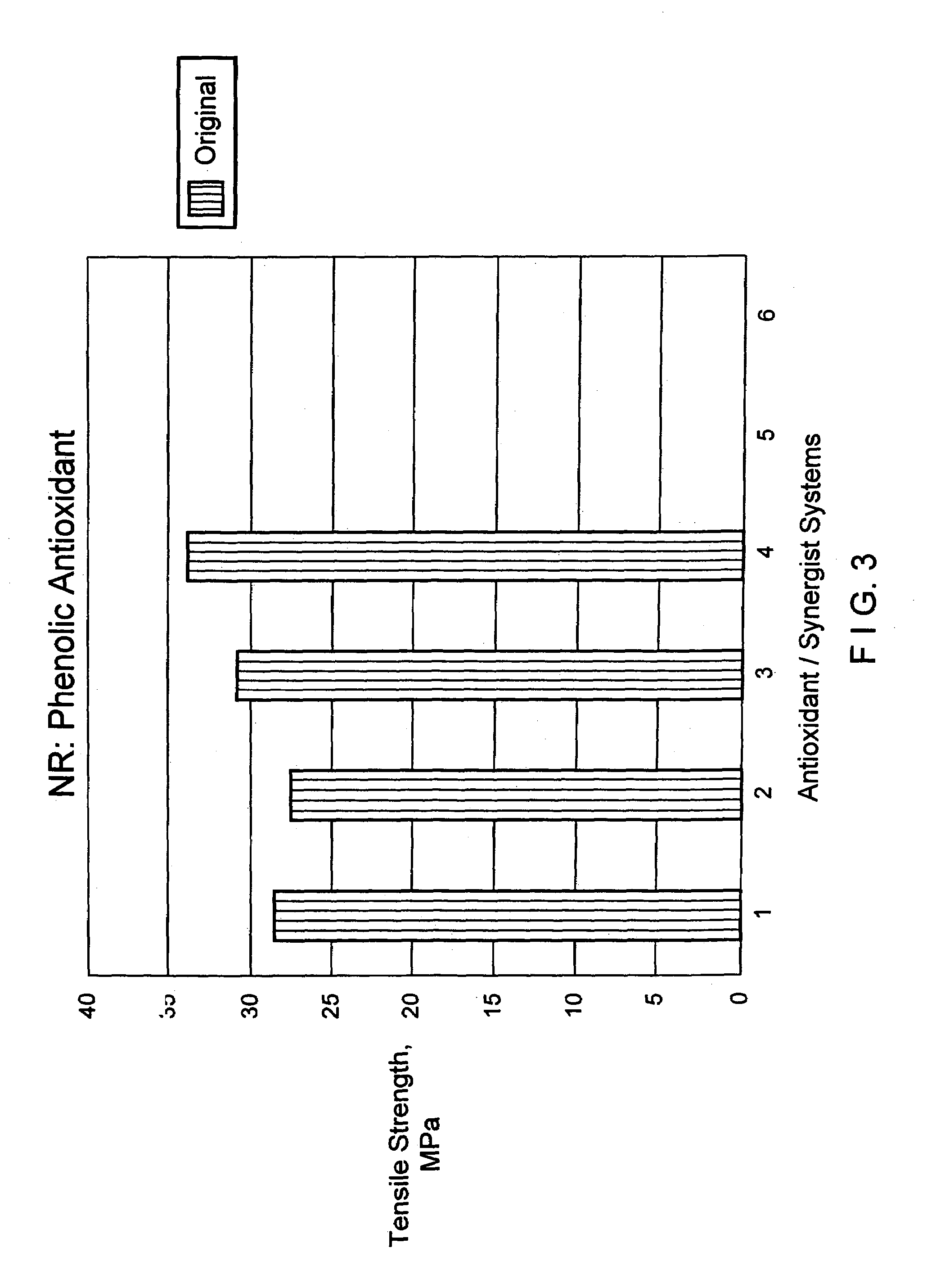Latex film compound with improved tear resistance
a technology of latex film and compound, applied in the field of latex film compound, can solve the problems of shortening the useful life stiff and brittle rubber, and unusable class of compounds, and achieve the effects of improving the tensile strength, elasticity and aging properties of the latex produ
- Summary
- Abstract
- Description
- Claims
- Application Information
AI Technical Summary
Benefits of technology
Problems solved by technology
Method used
Image
Examples
example 1
Natural Rubber with Amine Anti-oxidant
[0036]High Ammonia Natural Rubber latex is used as the base polymer, sodium lauryl sulfate is the stabilizer, sulfated methyl oleate is a film surface conditioner. The zinc oxide, sulfur and dithiocarbamate accelerator comprise the curing system.
[0037]
PHRHigh Ammonia Natural Rubber from Latex (NR)100Sodium Lauryl Sulfate1Zinc Oxide0.5Sulfur0.5Dithiocarbamate Accelerator0.75Potassium Hydroxide0.15Sulfated Methyl Oleate1
[0038]To this composition, the amine antioxidant octylated diphenylamine (ODPA) and the antioxidant synergists ZMTI and MTI were added as follows:
[0039]
PHR123456ODPA121100ZMTI001010MTI000101
[0040]FIG. 1 shows the effect of a 30 minute cure at 100° C. on tensile strength. It can be seen that all six tests have roughly a tensile strength of about 35 MPa.
[0041]To simulate the aging process of the natural rubber, the compositions were exposed to temperatures of 100° C. for 24 hours. The results are seen in FIG. 2.
[0042]It can be seen t...
example 2
Natural Rubber with Phenolic Antioxidant
[0044]High Ammonia Natural Rubber latex is used as the base polymer, sodium lauryl sulfate is the stabilizer, sulfated methyl oleate is a film surface conditioner. The zinc oxide, sulfur and dithiocarbamate accelerator comprise the curing system.
[0045]
PHRHigh Ammonia Natural Rubber from Latex (NR)100Sodium Lauryl Sulfate1Zinc Oxide0.5Sulfur0.5Dithiocarbamate Accelerator0.75Potassium Hydroxide0.15Sulfated Methyl Oleate1
[0046]To this composition, the phenolic antioxidant polybutylated bisphenol A (PBBA) and the antioxidant synergists ZMTI and MTI were added as follows:
[0047]
PHR1234PBBA1211ZMTI0010MTI0001
[0048]FIG. 3 shows the effect of a 30 minute cure at 100° C. on tensile strength. It can be seen that the combination of phenolic antioxidant with a antioxidant synergist (tests 3 and 4) increases tensile strength relative to the addition of phenolic antioxidant alone (test 1 and 2). Note that doubling the amount of phenolic antioxidant (test 2) ...
example 3
Synthetic Rubber with Phenolic Anti-oxidant
[0051]Polychloropropene is the base polymer, sodium lauryl sulfate is the stabilizer, sulfated methyl oleate is the film surface conditioner and zinc oxide, tetramethylthiuram disulfide and dithiocarbamate accelator comprise the curing system.
[0052]
PHRPolychloropropene from Latex (CR)100Sodium Lauryl Sulfate1Zinc Oxide5Dithiocarbamate Accelerator0.75Tetramethylthiuram Disulfide1Sulfated Methyl Oleate1
[0053]To this composition, a phenolic antioxidant, (PBBA), and antioxidant synergists were added as follows:
[0054]
PHR123456PBBA121100Zinc 2-mercaptotoluimidazole0010102-Mercaptotoluimidazole000101
[0055]FIG. 5 shows the effect on tear strength of aging the synthetic rubber for 4 days at 100° C. following a 45 minute cure at 141° C.
[0056]It can be seen that films containing a combination of phenolic antioxidant with an antioxidant synergist (tests 3 and 4) result in greater tear strength relative to adding antioxidant alone (test 1 and 2) both be...
PUM
| Property | Measurement | Unit |
|---|---|---|
| temperatures | aaaaa | aaaaa |
| temperatures | aaaaa | aaaaa |
| tensile strength | aaaaa | aaaaa |
Abstract
Description
Claims
Application Information
 Login to View More
Login to View More - R&D
- Intellectual Property
- Life Sciences
- Materials
- Tech Scout
- Unparalleled Data Quality
- Higher Quality Content
- 60% Fewer Hallucinations
Browse by: Latest US Patents, China's latest patents, Technical Efficacy Thesaurus, Application Domain, Technology Topic, Popular Technical Reports.
© 2025 PatSnap. All rights reserved.Legal|Privacy policy|Modern Slavery Act Transparency Statement|Sitemap|About US| Contact US: help@patsnap.com



